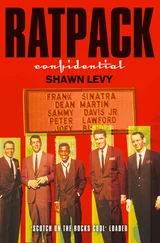They made a movie. All they had to call it was Evel Knievel . It sold itself. George Hamilton made the thing. Wrote it and starred in it. When he came to ask us for permission, came to our hotel room in the Sands to ask us to sign the deal and take the check, we made him read the script, start to finish. At first he wouldn’t do it, but we took out that shiny new Luger and pointed it at him and said, “Read it, motherfucker,” and he read it, and he trembled, and we signed.
It was a mistake. We make them, occasionally. On film, George Hamilton looked soft and weak, and somehow he made the scripture sound like shit:
“Ladies and gentlemen, you have no idea how good it makes me feel to be here today. It is truly an honor to risk my life for you. An honor. Before I jump this motorcycle over these nineteen cars — and I want you to know there’s not a Volkswagen or a Datsun in the row — before I sail cleanly over that last truck, I want to tell you that last night a kid came up to me and he said, ‘Mr. Knievel, are you crazy? That jump you’re going to make is impossible, but I already have my tickets because I want to see you splatter.’ That’s right, that’s what he said. And I told that boy last night that nothing is impossible.”
As if we could be imitated. As if you could pretend to be us.
• • •
We spent our time in jail for the beating and we smiled our way through it. We called in limousines to take us to our work-release jobs — to the shit-shoveling, broom-holding, tray-filling labor they tried to punish us with — and so we called our people and had them line up sixteen limousines outside the Los Angeles County jail, and all these guys got a ride, showed up for the shit shovel in a limousine, thanks to yours truly, and they did not forget it, these guys, they worshipped us, just like everyone else. And when the jailers complained, and the judge hauled us in, and told us he had half a mind to restore our full sentence — first-degree assault, he called it, a two-year hitch — we simply smiled and apologized and told him, “Why, Your Honor, I merely wanted to return to these men some of the dignity they may have lost within the walls of incarceration, not to make light of the punishment, Your Honor, but to return to these men some sense of their own natural grandeur, their own native royalty, so they might see themselves as something other than low, something more than criminal, and return to society with the hopes and dreams that might make them all better men,” but still, they said no more limousines, no more press conferences at the jail’s back door, and we said, Okay, sure, thank you, Your Honor.
It was hard. It was humbling and hard, America, and don’t you forget it. We swallowed that down, and we swallowed everything else in those days. The toy people pulled their deals, and that was the hardest, because we were rolling in the toy money then — the wind-up racer, the action figures, the bicycles with the Evel Knievel nameplates, the Evel Knievel cane. On and on and on, little idols of the god in every house, and every one of them sending us the purest American love there is: the dollar. But now we were losing that love. Our agent told us to lie low for a while, let it blow over, but no: we called a press conference and apologized to the judge — wink! — for turning his courtroom into a joke, if that’s what he thought we had done, and pledged to take it more seriously from then on.
Winked at the press boys, and they howled. Like broads, the newspaper boys. Give ’em a wink and a story and they’ll drop right to the floor.
Got home after all this and what did we find? On the gate — that marvelous fucking gate, the scrollwork, that beautiful Butte artistry — was a little handwritten sign: SEE THE SON OF EVIL KNIEVEL JUMP. TWENTY-FIVE CENTS.
Eleven years old, he was. Little fucker. Couldn’t even spell the old man’s name right.
October 4, 1975 GOODING, IDAHO
Loretta is awake, lying on the makeshift pallet behind the blankets tacked up in the basement, light filtering through the shelved jars of peaches and tomatoes, when Ruth taps down the stairs and calls, “Good morning, Sister.” She waits for Loretta to answer before going back upstairs. Loretta sits up. Her insides coil and uncoil. She has been awake for hours.
She brushes her teeth at the deep washbasin and washes her face and hands with the blackened bar of industrial soap, and puts on her dress. She can’t stop thinking about Bradshaw up there, at the table already, probably, grinning and grinning. Here . Here to help with the rabbit drive. Here to help set up Zion’s Harvest in its new home. Here in the constantly watching world. He will sit there, the truth of him and her showing in her face.
She comes into the kitchen, and there he is, cheeks stuffed, eyes upon her. The sight of him fills her with sick thrill. Outside, framed in the window above the sink, Dean argues loudly with a man standing in front of a TV news van — KMVT-11, “Your Local News Leader.” Other pickups and vans have parked in the driveway as well, and groups of men are moving around out there. Strangers. Dean has said this will be a way of establishing themselves in the community. A way of distinguishing himself from his brother.
“Like a welcome-home party,” he said.
• • •
Jason clomps across the yard in his rubber boots, and goes into the tank room of the milking barn. Behind a swinging door, he sees his dad at work between the chutes, aiming the sharp, hissing stream of a hose at a shit-splattered udder. The suck and gasp of the machinery obliterates all other sound, and milky air fills his sinuses. At the sink, behind the gleaming silver tank, he fills the bottles, attaches the large red nipples, and loads the wire carrier. Heading for the calf pen, dull with weariness, he looks at the edges of his boots, crusted with bits of grassy manure and half-digested bits of hay, and thinks of the day when he will sleep as late as he wants to and wake to sweet-smelling air.
It sucks, the milking, but it sucks less than seminary. Today is Saturday, but Jason has returned to morning chores full-time ever since the day he and Loretta skipped seminary. That night, Ruth called his mom and said they didn’t think Loretta would be going anymore, because the other kids made her feel out of place. “I’ll bet they did,” Jason’s mom said drily when relating the conversation over dinner, and no one else commented. Jason finds it infuriating that no one else seems to think about Loretta. About what they need to do for her. All his mom and dad can consider is their embarrassment.
So he’d stopped going to seminary. A minor insurrection, but one that his parents fought every day, in indirect ways. He could feel them eyeing him, wary, trying to get a read on the best way to overcome this and set him back on the path. When he had first told his parents he wouldn’t go to seminary anymore, his father had stopped and blinked, as if he hadn’t understood the words, and then he said, “That’s ridiculous.”
Still, now, day after day, even this morning as he upends the bottles in the wire holders, watching the calves slurp hungrily at the thick red nipples, Jason clings to this: Still think it’s ridiculous, Dad? Over there, Dean is getting ready to have his bunny bash. The rabbit drive. Talk about ridiculous. Talk about ridicule. It’s been in all the papers, on the TV news. The Humane Society has raised hell about it. Ridiculous.
Jason is retrieving the empty bottles when his father comes crunching up in his canvas jacket and red-and-black Scotch cap. He is unshaven, and the gray on his hollow cheeks makes him look weak. Sick, even. Something in him has crumbled lately, and Jason holds this against him.
Читать дальше












